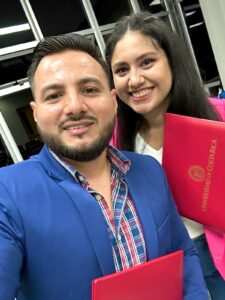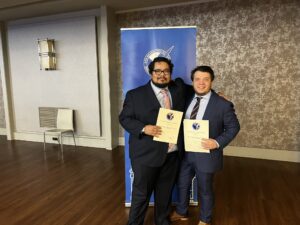Costa Rica, the country that was considered a safe haven in Central America for journalistic practice, has seen a gradual worsening of press freedom and security conditions.
Hundreds of journalists from Nicaragua and some others from Guatemala chose to go into exile in Costa Rica to escape their authoritarian governments. Even El Faro, the most acclaimed newspaper in El Salvador, moved its administrative and legal offices to Costa Rica in April 2023, following judicial harassment by the government of President Nayib Bukele.
But, the situation in Costa Rica has taken an unexpected turn in the last year. Rodrigo Chaves, president of that country since May 2022, has openly confronted the media and journalists critical of his management.
Also, according to the Report on the state of freedom of expression and the safety of journalistic practice in Central America from the Freedom of Expression and Right to Information Program (PROLEDI), there is a record of digital harassment of journalists by government authorities, as well as a political use of the state advertising.
Exiled journalists from Nicaragua and Guatemala told LatAm Journalism Review (LJR) that they no longer feel as safe as when they arrived in Costa Rica a couple of years ago, nor have they achieved the economic stability they expected.
“The Nicaraguans who have had to go into exile and live here in Costa Rica are not going through their best moments. Costa Rica is an expensive country and that means journalists need to generate extra income by doing other activities that are not necessarily related to journalism,” Néstor Arce, director of the Nicaraguan media Divergentes, told LJR.
Costa Rica is one of the most expensive countries in the region. A single person needs on average 751,800 Costa Rican colones (about US $1,400 US) per month to cover the costs of living in San José, Costa Rica. That’s almost double what is needed in Nicaragua.
Furthermore, the journalists interviewed conclude that the security bubble in Costa Rica was broken when Nicaraguan opposition leader Joao Maldonado was shot eight times in the city of San Pedro de Montes de Oca. Some suspect that the repressive parts of the Ortega regime are able to reach the other side of the border.
“The attack on Maldonado triggered many alarms not only among political or human rights activists, but also within the journalistic community. We live here, we walk on the street, we use public transport, we go shopping and now we don't know if they are watching us or following us. So, an environment where you supposedly felt safe and where you have the status of a refugee, you no longer feel safe, you are more afraid,” Arce said.
For this reason, Arce, who has been in exile for a little more than two years, said that he has preferred to take security measures such as being less exposed on the street. However, he said he has not received any kind of threats.
Considering the challenges that journalists in Costa Rica are facing, some of those in exile have decided to seek refuge in other countries. Spain, Mexico and the United States are the most common destinations, according to those interviewed.

Nicaraguan journalists Geovanni Schiffman and Lidia López left Costa Rica because they did not feel safe in that country due to its proximity to Nicaragua (Photo: Courtesy).
In July 2022, Nicaraguan journalist Geovanni Schiffman had to run from his country to Costa Rica, along with his wife and fellow journalist, Lidia López.
“The regime unleashed a hunt against all the journalists of the newspaper La Prensa, where my wife and I worked. La Prensa was the only media outlet that covered the expulsion from Nicaragua of a group of nuns. That unleashed the fury of the dictatorship, because according to the regime, no one knew the day and time that the nuns would be removed as if they were criminals,” Schiffman told LJR.
“That night on July 6, 2022, they were arresting two newspaper drivers, including the one who had driven my wife and the photographer the day they were covering the story. Then they went for her, but they had already alerted us so we left the house half an hour before they arrived," he added.
Schiffman and León lived in Costa Rica for nine months until, thanks to family members, they got the opportunity to travel legally to the United States through humanitarian parole.
According to Schiffman, the main reason for leaving Costa Rica was not feeling safe in that country due to its proximity to Nicaragua.
“My wife has an open accusation in Nicaragua and, being so close, it generated a lot of mistrust in us because in Costa Rica there are not only people from the opposition, but also people who are sent by the regime in Nicaragua to control and monitor the opposition,” he said.
Furthermore, Schiffman and López’s immigration status in Costa Rica was not stable either. According to the journalist, his appointment to request refugee status, and obtain recognition as a refugee, was scheduled for the year 2032. That is almost ten years of waiting.
The economic situation also influenced his decision to leave Costa Rica. Schiffman explained that it was difficult for them to support themselves doing journalism and, at the same time, cover their basic expenses, also considering the high prices in Costa Rica compared to those in Nicaragua.
Now in the United States, returning to practice journalism has become more difficult.
“The first thing that would have to change for me to return to journalism is for the Nicaraguan dictatorship to fall. Although there are still independent Nicaraguan media in exile, they are doing everything possible to survive. I understand that there are funding cuts and this whole situation has generated some economic instability in the profession. I am not the only journalist who has left the profession,” Schiffman said.

Wilfredo Miranda [right] and Nestor Arce [left] of the Nicaraguan media Divergentes, both exiled in Costa Rica, consider that journalism is facing a workforce crisis (Photo: Courtesy).
There aren’t just Nicaraguan refugee journalists in Costa Rica. The country has also been sought out by Guatemalan journalists who face judicial harassment in their country.
That is the case of Sonny Figueroa, co-founder of Vox Populi, who left Guatemala due to censorship, attacks and persecutions that have worsened in the last 10 years. He is in Costa Rica with about 25 other journalists.
“In the end, being in the programs that take you out of your country, whether to Costa Rica, Mexico or any other country, it is a relief because you get out of that risky situation you were in. But, that uncertainty also begins as to what will happen after the program ends. Am I looking for another program? Will I be able to return? What am I going to live on? Etc,” Figueroa told LJR.
According to the Guatemalan journalist, being outside the country has greatly complicated the process of continuing to do investigative journalism. This is because he is limited in terms of conducting interviews in the field or obtaining documents.
“We have people who help us find information in the country so we can continue working. But there are many people who do not want or cannot support us. They don't want to be linked directly to us because in the end that also implies a risk,” Figueroa said.
For journalist Wilfredo Miranda, co-founder of the media outlet Divergentes and also one of the Nicaraguan journalists exiled in Costa Rica, journalism is facing a workforce crisis.
“Every day fewer people want to do this crazy job that entails a lot of visibility and persecution. There are fewer and fewer journalists in the market and new ones are not being trained either. For example, if two or three journalists from Divergentes resign, it is very difficult to find a replacement for them,” Miranda told LJR.
Despite all the obstacles that journalism faces and the difficulties that have arisen in Costa Rica, for Miranda this “has been a country that has historically been the escape valve for Nicaraguans, especially refugees, political refugees. I think it would be a lie to complain about this country that has welcomed us quite well, has given us refuge and has given us protection,” he said.
“Although it is true that with the arrival of the Rodrigo Cháves government, the issue against journalists has become somewhat tougher, especially against local Costa Rican journalists, I believe that it is still the safest country in Central America in which, we journalists Nicaraguans, at least we can be refugees,” he said.